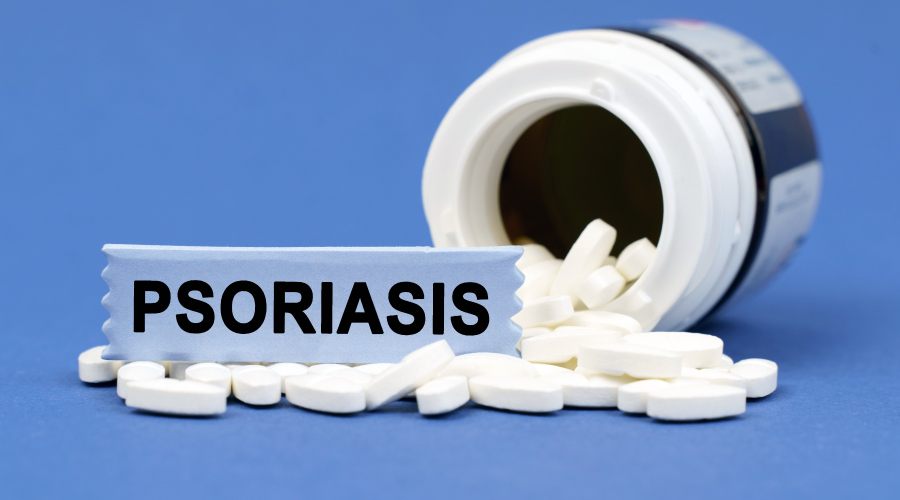

Plaque psoriasis is one of the chronic autoimmune diseases that affects millions of people across the world. The standard type of psoriasis causes patches of red, inflamed skin covered with silvery-white scales. This is the most prevalent form of psoriasis, accounting for about 80-90% of all cases. It occurs because the immune system mistakenly attacks healthy skin cells, making them multiply much quicker than normal. Because of this overly accelerated rate of cell growth, raised, inflamed patches of skin covered with silvery-white scales develop, which are known medically as plaques.
Psoriasis Causes and Risk Factors
The actual psoriasis causes are unknown/not understood completely, but several factors can predispose it.
- Genetics: One is at risk if there is a history of psoriasis in the family.
- Immune system malfunction: It will cause the immune system to overreact, which further causes inflammation and the growth of skin cells at a very high rate.
- Environmental exposures: This includes stress, infections, certain medications, and climatic changes that incite the symptoms or increase their intensity.
- Lifestyle factors: such as smoking, excessive consumption of alcohol, and obesity are related to increased risk and severe forms of psoriasis.
Symptoms and Areas Affected
The main psoriasis symptoms are as follows:
- Patches of inflamed, red-coloured skin
- Silvery-white scales on patch areas
- Skin patches that are dry and cracked with possibly bleeding
- Itching, burning, or soreness in skin patches
The common areas affected usually are:
- Elbows and knees
- Scalp
- Lower back
- Genitals
- Hands and feet
- Face and neck
Diagnosis of Plaque Psoriasis
Most of the time, the diagnosis of this condition is as follows :
- Physical examination: The dermatologist examines the skin, nails, and scalp and checks for plaque psoriasis signs.
- Taking the medical history: One describes their symptoms; it includes asking for family history and possible disease triggers.
- Skin biopsy: It may sometimes be necessary to take a small skin sample to observe the condition and rule out other similar ailments.
How to Cure Psoriasis Permanently
It’s a common question to be asked by the people who have been facing this condition- How to cure psoriasis permanently. Well, no treatments are available to cure this chronic disease, but several psoriasis treatment options can manage its symptoms and improve the quality of life. These include
-
Topical psoriasis treatment:
- Corticosteroids: These reduce inflammation and slow down cell growth.
- Vitamin D analogues: Aid in reducing the growth of skin cells
- Retinoids: Normalizes growth of skin cells alone
- Coal tar: Reduces scaling, itching, and inflammation
-
Light therapy:
- UVB phototherapy: It’s a process where the skin is exposed to controlled quantities of ultraviolet B light.
- PUVA: This psoriasis treatment combines UVA light with psoralen medication to increase skin sensitivity to light.
-
Systemic medications:
- Methotrexate: This is an immune suppressant. It reduces the rate of growth of skin cells.
- Cyclosporine: This is an immunosuppressant
- Biologics: These are targeted immunosuppressants
-
Oral medication:
- Apremilast: This is an anti-inflammatory; it is used on plaque psoriasis
-
Lifestyle Modifications:
- Stress management
- Exercise routine
- Nutritious diet
- Avoid alcohol and quit smoking
Factors that Help You Manage Psoriasis Symptoms
The psoriasis treatment is limited to medications and includes the individual’s lifestyle. Following are a few lifestyle and home remedies for psoriasis symptoms:
- Keeping the skin moist to reduce scaling
- Using mild, fragrance-free skin care products
- Bathing in lukewarm water enhanced with colloidal oatmeal or Epsom salts to moisturise the skin
- Not to scratch on or pick the plaques
- Use soft and breathing fabric so that the skin does not get irritated with the fabric
- Keep the personal triggers under control that are causing the effect
- Aid the emotional effect by going for support or counselling services
Complications and Other Associated Conditions
Plaque psoriasis can create some complications, apart from some of the other health-related conditions, such as:
- Psoriatic arthritis: It is a joint disease that affects up to 30% of individuals with psoriasis
- Cardiovascular disease: Increased risk for the development of heart diseases and stroke.
- Type 2 diabetes: The body either does not produce enough insulin or there is resistance to insulin.
- Depression and anxiety: Persistent and excessive worry that interferes with daily activity.
- Metabolic syndrome: Includes Obesity, high blood pressure, and abnormal levels of cholesterol
When to Contact a Medical Professional
Contact a dermatologist if you have:
- Symptoms of plaque psoriasis for the first time
- Experience joint pain or stiffness as the first sign of psoriatic arthritis
Observe how the symptoms are worsening, along with new areas of psoriasis development (if any). If you feel that the medications or psoriasis treatment options are not helping control the disease, contact your medical practitioner immediately.
Conclusion
From what is psoriasis to how to cure psoriasis permanently and its different treatments, we have reached the bottom line of the blog. Hope you would have gathered sufficient information about this condition in depth. Summarising it up, we can say plaque psoriasis is a skin disease with long-term treatment, management, and care. Its permanent cures may not be available, but various treatments can make the condition much more tolerable and improve quality of life. These involve topical treatments, light therapy, medications, and lifestyle changes. Continuous care and management are part of living with this condition. Proper care offers tremendous benefits for most people. Most individuals with psoriasis




